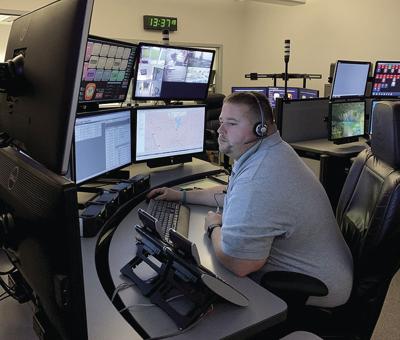LACONIA — The homeowner whose house is on fire. The woman whose ex-boyfriend is trying to break the door down. The guy who has just come home to find his roommate unconscious on the floor — perhaps from a drug overdose. The wife whose husband is having a heart attack.
For people in these and other traumatic situations, the first help they receive is not from a police officer, firefighter or EMT. It’s from an emergency dispatcher. They are protectors of public safety who do their work out of the public eye, in rooms illuminated by the glow of multiple computer monitors.
In an emergency, the dispatcher is the voice on the other end of the telephone executing the careful dance of emergency services. They often hear the worst of the worst and must tell police, fire and ambulance crews where they need to go.
“They are on the front lines when they are talking to people who have just witnessed the worst moment in their life,” said Belknap County Sheriff Mike Moyer, whose department handles police dispatching for nine communities.
For Moyer they are the unsung heroes of the emergency services.
This week the country marks National Public Safety Telecommunications Week, and those involved in the emergency response profession say such an observance is especially warranted, given that many people have a misconception of what a dispatcher’s work is like.
Some think of a dispatcher’s job as being more like that of a secretary or administrative assistant.
In truth, dispatchers handle multiple tasks, in what often is a tension-filled, fast-paced situation made all the more stressful by a panicked caller who has difficulty focusing enough in order to provide basic information – information that is critical so that first responders know what they are likely to confront when they arrive on the scene.
Most calls going to local emergency dispatchers are filtered through the state’s 9-1-1 system, which evaluates the initial information, then hands the caller over to the appropriate local dispatch center.
Dispatchers are trained to ask questions that are specific to the kind of situation the caller is in.
“You want to paint a picture to the responding officer,” said Cheryl Keenan, who was a dispatcher at the Belknap County Sheriff’s Department for more than 10 years before taking on the job as Moyer’s administrative assistant last year.
After finishing college, Keenan went to work as a summertime dispatcher at Marine Patrol, where one member of her family was a patrol officer
“I fell into it, and loved it,” Keenan of her work as a dispatcher, which included two stints at the Sheriff’s Department, and time with the Tilton Police Department.
But Keenan readily acknowledges the job had more than its share of traumatic moments.
She vividly remembers taking a call from a young woman who had just arrived at a residence to find that her boyfriend was dead inside. He had taken his own life.
“I was talking to her and then all I could hear was the sound of vomiting,” she said.
It is human nature to feel heartbreak in the face of tragedy, but heartbreak is an emotion dispatchers can’t afford. They have to stay focused on processing the information they’re absorbing to handle the situation.
Moyer said dispatchers handle calls from suicidal people or those in distress more often than people realize. And sometimes they get calls from people — the elderly in particular — who are just lonely and want someone to talk to.
“They’ll talk to them. But if another call comes in they have to let them go,” Moyer explained.
While dispatchers must be smart and efficient, the job also requires a human touch.
“They need to be patient and empathetic,” Laconia Chief Matt Canfield said. That is easier said than done, Canfield added, because on some shifts dispatchers get no let-up. “It’s just go, go, go,” he said
Like law enforcement agencies Lakes Region Mutual Fire Aid, which dispatches for fire and emergency medical services in 35 area communities, also receive their share of calls from distraught people, according to Jonathan Goldman, the agency’s chief coordinator.
“Our dispatchers are the first point of contact for anyone needing help,” Goldman said. “Sometimes we prevent a suicide attempt. Other times we talk someone out of going back into a burning building to do a self-rescue.”
Dispatchers need to be good at multitasking. At the Fire Dispatch Center, dispatchers often need to send equipment and personnel from multiple departments to the scene of a fire or traffic accident.
The job involves “a lot of coordination involving multiple departments,” Goldman said. “The more (the situation) escalates, the more resources you have coming” to an incident scene.
Mutual aid dispatchers can also find themselves on the front lines in times of severe storms that knock down trees, snap electric power lines or making it hazardous or impossible for emergency vehicles to travel on certain roads.
In late October 2017 the agency handled more than 400 calls in a 24-hour period during a severe storm with hurricane-force wind gusts that produced widespread power outages. That storm set a record for the most calls in one day in recent history, Goldman said.
But Goldman pointed out that, even when the agency’s dispatchers are dealing with a multi-alarm fire, a traffic accident with multiple injuries, or the impact of a serious storm, the more routine-type calls keep coming as well.
Covering more than three dozen communities, Lakes Region Mutual Aid has the busiest dispatch center in the area. Last year, the agency dispatched for 26,735 emergency calls for service. Of that number 17,205 — or 64 percent — were for medical aid, and 9,530 were for fire or motor vehicle-related incidents, according to Goldman.
The burnout rate is high among dispatchers. Goldman said that the nationwide average longevity of a dispatcher is three to five years. However, Goldman said the average tenure at his agency is 10 years, and he has dispatchers who have been there much longer than that. Canfield, too, said there is relatively little turnover among dispatchers at the Laconia Police Department.
Because dispatchers, by necessity, work behind the scenes, Lakes Region Mutual Aid has taken steps to increase its social media presence as well as have dispatchers more involved in community activities.
“We try to get the staff out there,” Goldman said.
But given the reality of the work, Keenan said dispatchers need to be comfortable with being away from the limelight.
“You’re an unseen force. You can’t be looking for praise,” she said.
But this week’s observance of National Public Safety Telecommunications Week is meaningful for her.
“Once a year it’s nice to see who these people are,” she said.
A dispatcher’s job, with its special demands, requires a special person.
“You either can do it, or you can’t,” said Keenan.
Canfield concurred. “You have to have the right person (for the job), and the right personality.”


















(1) comment
Great job as always from Lakes Region, but I have to wonder if the "journalist" did his due diligence and researched the other dispatchers that "pass it off"? If he did he would not have said that they "pass it off". The ones he is referring to with that statement are the ones that stay on those medical calls giving life saving CPR , baby delivery, bleeding control, Heimlich etc etc. Amazes me how one can give praise to one center while completely disregarding and dismissing the other. Did this "journalist" know that these people that "pass it off" are in the same building where his interview took place? Did he bother to research the facts? Did he take 2 steps and knock on the door? Maybe a new article to fix the misinformation printed in his article?
Welcome to the discussion.
Log In
Keep it Clean. Please avoid obscene, vulgar, lewd, racist or sexually-oriented language.
PLEASE TURN OFF YOUR CAPS LOCK.
Don't Threaten. Threats of harming another person will not be tolerated.
Be Truthful. Don't knowingly lie about anyone or anything.
Be Nice. No racism, sexism or any sort of -ism that is degrading to another person.
Be Proactive. Use the 'Report' link on each comment to let us know of abusive posts.
Share with Us. We'd love to hear eyewitness accounts, the history behind an article.